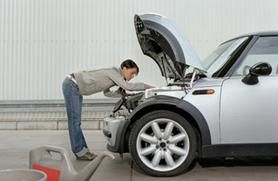This is one that you may or may not be your cup of beans, but if you do, just make sure that you buy an oil container large enough to handle the capacity of your vehicles oil and then take it to a recycling facility.
Millions of gallons of oil are spilled out into our soil, trash, and sewers by do-it-yourselfer's every year. This adversely affects our groundwater. It only takes about one gallon of oil to contaminate one million gallons of water...so this is one scenario where one person can really do a lot of environmental damage and may not even realize it.
As your oil ages it becomes thick like syrup and subsequently a lot harder for it to do its job. The recommended intervals for an oil change is every 3,000 miles, or every three months. Even if you don't drive your car often, you still need to change the oil often, because conventional oil can breakdown overtime.
One way to extend your oil changes is to use synthetic. Synthetic oil does not breakdown as easily, as it has a more durable composition. You could also think of synthetic as slightly better for the environment for this reason. You will only have to change it half as often, since synthetic has been proven to last around three times longer than conventional oils in most studies.
In addition, you will also want to use your manufactures recommended grade of oil. It has been found that you can save as much as 2 percent in fuel efficiency just by using the correct grade in your vehicle. Look for the phrase Energy Conserving on the label of your favorite oil, as you can then be sure it is using the latest in friction reducing technologies.
